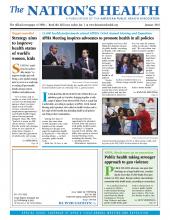Integrating health into all policies is an ambitious goal, as it involves bringing together a wide range of players from diverse fields. But it is a goal that is achievable, according to speakers at APHA’s 143rd Annual Meeting and Exposition, who called on health workers not to lose sight of the benefits that including health in all policies can bring to their communities.

U.S. Surgeon General Vivek Murthy, left, speaks with U.S. HUD Secretary Julián Castro at a Monday, Nov. 2, general session.
Photo courtesy EZ Event Photography
During five days of events, the more than 13,000 attendees who came together at the Annual Meeting in Chicago were urged to implement health in all policies — the official meeting theme — in their everyday public health work.
Held Oct. 31-Nov. 4, the meeting provided an opportunity for attendees to learn from and interact with public health leaders, including U.S. Surgeon General Vivek Murthy, MD, MBA, who spoke at several Annual Meeting events, including the Sunday, Nov. 1, opening session.
Information, inspiration and equality are key to fulfilling the ultimate mission of public health, according to Murthy, who called on attendees to be creative with their public health messages and to find new partners to help advance health in all policies.

Audience members listen at a climate change scientific session.
Photo courtesy EZ Event Photography
“As professionals who understand that health has to be woven into every strand of public policy and into the environment in which we live, we can’t be content solely to educate,” Murthy said. “We can’t allow ourselves to just be another voice in the crowd. And that’s why we must consider how to inspire people in communities to translate information into action that will lead to better health.”

Annual Meeting attendees pose for a photo using a selfie stick in front of the HIV/AIDS Section booth at the expo.
Photo courtesy EZ Event Photography
Murthy related how he has been inspired by health workers and communities around the nation who are working for change, from a fatherhood initiative in Richmond, Virginia, to an Alabama congregation that is working to eat healthily.
Murthy said it is the work of public health advocates “to move people from a place of pessimism to a place of possibility,” and to bring together partners from fields as diverse as transportation, housing, law enforcement and education on health.
“We have the power to change the world around us. The question is, ‘Do we choose to do so?’ Our answer must be yes. We must step up and be the leaders the world needs.”
An important part of achieving health in all policies is health equity, a topic that was at the forefront throughout the Annual Meeting. While increasing health care access is important, it is not enough to end inequities, said then-APHA President Shiriki Kumanyika, PhD, MPH, citing factors such as housing conditions, the environment and healthy food.
“Addressing health equity is a major part of the healthiest nation effort,” she said during the opening session. “Inequities in the conditions that influence health have a greater impact on the populations that are in need of our special protections — the protections of public health and of human rights.”
Kumanyika urged meeting attendees to become a part of Generation Public Health, APHA’s movement to create a healthier nation, and to bring new partners to the public health table.
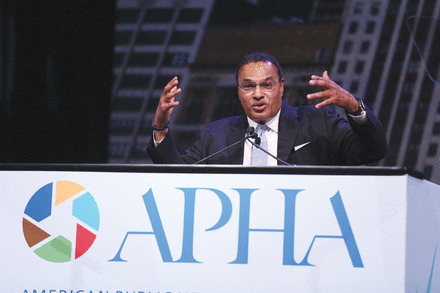
Freeman Hrabowski, president of the University of Maryland-Baltimore County, called on attendees to speak up for health.
Photo courtesy EZ Event Photography
The conversation on health inequities continued during a Monday session with then President-elect Camara Jones, MD, PhD, MPH, who highlighted the connection between racism and health. Jones discussed her new APHA presidential initiative on racism, pledging to bring together partners to address the issue during her term as Association president, which began in November. Racism “saps the strength of the whole society through the waste of human resources,” she said, making it a vital issue for public health to confront.
“I know that this is going to be a fantastic year for us to raise this important conversation for the nation,” Jones said during an APHA TV interview at the Annual Meeting. “It is such an important topic.”
The presidential initiative follows APHA’s four-part summer webinar series on racism and health that attracted thousands of participants. The series, which can be viewed on APHA’s website at www.apha.org/health-equity, discussed the links between racism and violence as well as disparities in health care and education. The new efforts are part of APHA’s work on health equity, which is a guiding priority and core value for the Association.
The Annual Meeting’s focus on health in all policies was also apparent during a Monday, Nov. 2, Annual Meeting general session on the National Prevention Strategy, which focuses on empowering people, creating healthy and safe communities, providing clinical and community preventive services and eliminating health disparities.
When it comes to housing and health, the Department of Housing and Urban Development has made investments such as remediating housing that contains lead, removing mold from housing units in tribal communities and pushing for smoke-free public housing, said Julián Castro, JD, HUD secretary, during the Monday session, which was led by Surgeon General Murthy.
“We have a modest request in this year’s budget to do a demo project to study the impact of elderly housing with strong supportive health services to show concretely that investing on the front end will make a difference in the back end in saving Medicare dollars,” Castro said.
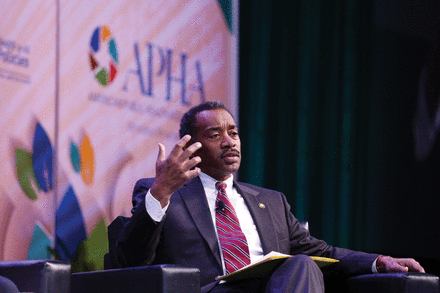
Jonathan Woodson, assistant secretary of defense for health affairs at DOD, speaks at a Monday, Nov. 2, session.
Photo courtesy EZ Event Photography
Jonathan Woodson, MD, assistant secretary of defense for health affairs at the Department of Defense, said it is important that people understand how to build healthy populations. His department, which oversees health care for 10 million people, has been instrumental in creating community health promotion councils. The councils are managed by people in military communities who assess the health and wellness needs of military members and their families.
“The Department of Defense is a microcosm of society,” Woodson said. “The individuals in service are your brothers and sisters, your mothers and fathers…we represent the diversity that is America. We are affected by those problems that occur in society.”
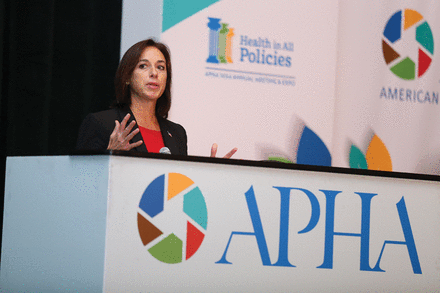
Acting U.S. Assistant Secretary for Health Karen DeSalvo told closing session attendees there is still much work to be done.
Photo courtesy EZ Event Photography
When asked how to achieve health changes on the local level, outgoing APHA President Kumanyika said the first thing to do is talk with people who are going to be affected. While public health workers feel they know what is best, going over the heads of the people in the community is “almost a guarantee for failure.”
“Being right is not the same as being effective,” Kumanyika said. “It’s basic human relationship building at the end of the day.”
The focus on health in all policies continued through the Wednesday, Nov. 4, closing session, which also hewed closely to Jones’ work on dismantling racism. Upon receiving the president’s gavel from Kumanyika, Jones challenged all attendees and each of APHA’s member groups to help people of color achieve health equity. Her speech segued into a panel on changing the narrative around public health and safety in three cities dominating the news in 2015: Chicago, Baltimore and St. Louis.
Starting with a conversation about health equity, Jones spoke with Julie Morita, MD, Chicago commissioner of health; Leana Wen, MD, Baltimore city commissioner of health; and Faisal Khan, MD, MBBH, MPH, director of public health in St. Louis County, Missouri, about how safety, health and racial justice played a part in the aftermath of recent violence in their cities, combined with decades of racism, poverty, social inequities and a lack of access to health care and other services.
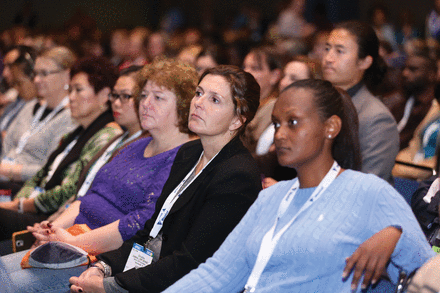
Meeting participants listen to speakers at the Wednesday, Nov. 4, closing session, which focused on healthy, just communities.
Photo courtesy EZ Event Photography
Addressing the communities’ traumas through public health requires advocates to rethink what public health is, and how to adapt to communities’ needs, the panel emphasized. Khan said his team changed the county department name to include the word “public” to change community perceptions. Wen said she made a particular effort to reach people who are often overlooked, as they are the ones most in need of care.
“We in public health go to where people are,” Wen noted.
Though local public health workers and their impact were a focus of the closing session, speakers looked at a national and global impact as well. Acting U.S. Assistant Secretary for Health Karen DeSalvo, MD, MPH, MSc, addressed attendees and told them there is still much work to do, noting that “the moral responsibility of public health” never ends.
Making changes in public health approaches may feel uncomfortable, the panel said, but being loud and becoming a force for good are key points in becoming effective. Khan encouraged the audience to yell out, “I am a professional public health troublemaker, and I love it!”
Throughout the meeting, leaders and other speakers urged attendees to make their voices heard on public health.
“Advocacy is absolutely essential if you want to see the things you believe in, the things you hope for, become enacted into law,” said Rep. Danny Davis, D-Ill., in conjunction with an Annual Meeting session on race, poverty and health.
Speaking out for health was also a central theme during educator Freeman Hrabowski’s speech at the opening session. Hrabowski, PhD, MA, who is president of the University of Maryland-Baltimore County, is an advocate for bringing underrepresented students into the science, technology, engineering and math fields.
“You and I together, we have the responsibility of helping the general public, families and children and people in other professions understand that this theme, this notion of public health is not…a concept for a few but it must be all-pervasive,” Hrabowski said.
Hrabowski cited inequities that exist in U.S. higher education, noting that while two-thirds of white adults lack college degrees, 80 percent of blacks and 85 percent of Hispanics also lack them.
“We must do more as a democracy to help children at the bottom of our society,” he said. “It’s absolutely critical.”
Other common themes that arose throughout the meeting were confronting gun violence, expanding access to care and addressing climate change. Ed Begley Jr., an actor and environmental activist, who also spoke at the opening session, noted the important work public health has already done on climate change and called for workers to do more as the connections between health become more clear.
“The environment is a public health issue and that’s the way we have to frame it,” Begley said.
Videos from the opening session and Monday general session can be viewed via APHA’s multimedia Web pages at www.apha.org/news-and-media/multimedia. The pages also include videos from APHA TV, which broadcast interviews with meeting speakers and health leaders.
The Annual Meeting was a time to thank public health leaders, with APHA presenting its annual Association awards and member groups honoring public health leaders. APHA also called out its top advocates, honoring member Catherine Troisi, PhD, as its Advocate of the Year for outreach and op-eds on APHA priority issues. The Iowa Public Health Association received the APHA Affiliate Award for Advocacy for its work via the Public Health Action campaign and other advocacy.
The meeting was also a time to show support for public health. The meeting’s exclusive “I Heart Public Health” T-shirt, offered for the first time, sold out. Attendees also donated $14,000 to EverThrive Illinois, a Chicago nonprofit organization that works to improve the health of women, children and families.
Meeting participants shared their love of public health on social media, posting photos on Instagram, making updates on Facebook and sending more than 20,000 tweets with Annual Meeting hashtags. APHA’s Annual Meeting Blog, at www.aphaannualmeeting.blogspot.com, posted regular daily updates, which can be read online now.
The meeting was also a place for fun and physical activity, with yoga, stretching events and a choreographed dance session making the agenda. Participants in the Annual Meeting’s first walking challenge logged almost 8 million steps.
Continuing education opportunities were also a popular draw at the meeting. More than 1,400 attendees signed up to earn credits during scientific sessions, while hundreds of attendees participated in two days of in-depth public health Learning Institutes, some of which sold out.

APHA TV recorded interviews with Annual Meeting speakers and health leaders from an on-site studio at McCormick Place.
Photo by Michele Late
APHA’s Recorded Annual Meeting Presentations program, available now at www.apha.org/ramp, allows health professionals to take in session recordings. For a fee, RAMP provides online access to audio recordings synced with PowerPoint slides from hundreds of meeting presentations.
APHA’s 2016 Annual Meeting and Expo, which will be held Oct. 29-Nov. 2 in Denver, has a theme of “Creating the Healthiest Nation: Ensuring the Right to Health.” Abstract submissions are now being accepted for the 2016 meeting.
For more on APHA’s Annual Meetings, visit www.apha.org/annualmeeting. For more on Generation Public Health, visit www.apha.org/healthiestnation.
Natalie McGill and Lindsey Wahowiak contributed to this story.
- Copyright The Nation’s Health, American Public Health Association


